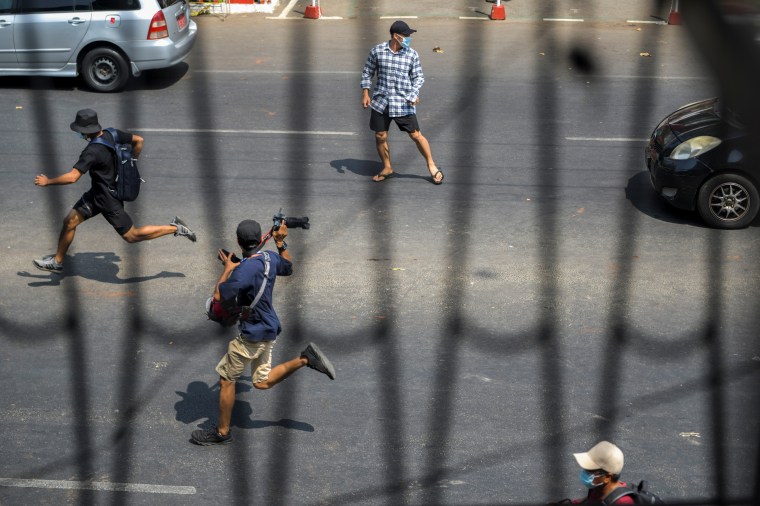CPJ calls for targeted international sanctions
New York, July 28, 2021—In the months since Myanmar’s military seized power in a February 1 coup, the country has become one of the world’s worst jailers of journalists, the Committee to Protect Journalists found in a special mid-year survey published today.
The report and accompanying prison census, “Bitter reversal: Myanmar military coup wipes out press freedom gains,” finds that as of July 1, 2021, at least 32 journalists were behind bars in the country. Myanmar’s post-coup assault on the press marks a drastic reversal of liberalizing policies implemented beginning in 2012.
“The dizzying pace at which military authorities have cracked down on journalists in Myanmar, as well as the sheer brutality of journalists’ treatment behind bars, should be deep cause for concern for leaders around the world who claim to stand for press freedom,” said Shawn W. Crispin, CPJ’s senior Southeast Asia representative. “Every journalist behind bars is another story silenced, meaning the people of Myanmar, and the world, will never get the full story of what is happening in the country.”
While journalists also faced harassment and prosecution under the rule of Aung San Suu Kyi, who was ousted in the February coup, independent media was allowed to work. Now, the broadened language of penal code 505(a) has effectively made independent journalism a crime. The threat of arrest has driven many news organizations to close their offices and forced journalists underground or into exile. Further complicating access to information and the ability to report, authorities have banned satellite media and imposed rolling restrictions on the internet.
Journalists who spoke with CPJ said their colleagues behind bars have been subjected to abuse and torture; at least three have reported health problems. Myanmar is also vulnerable to COVID-19, making a prison sentence acutely dangerous.
International reporting from Myanmar is also restricted; while only one foreign journalist was jailed at the time of CPJ’s survey, at least three foreign reporters have been detained and deported since the coup. Few foreign journalists have been allowed access.
CPJ’s report includes policy recommendations, including for the international community to implement targeted sanctions on the military leadership responsible for suppressing press freedom. CPJ also calls on India and Thailand to grant Myanmar journalists the ability to work safely in exile, and for ASEAN to swiftly implement its plan for brokering stability in the country. The report includes further recommendations to the U.S., EU and U.N.
The number of jailed journalists in Myanmar could well be higher than CPJ’s count, as many news organizations are reluctant to identify non-staff reporters due to concerns they could face retaliation for those ties. CPJ’s special census of journalists imprisoned in Myanmar is a snapshot of those incarcerated at midnight on July 1, 2021. It does not include the many other journalists jailed and released throughout the year. CPJ includes only those journalists who it has confirmed have been imprisoned in relation to their work.
Note to Editors:
“Bitter reversal: Myanmar military coup wipes out press freedom gains” is available on CPJ’s website. For questions or to arrange an interview with CPJ experts, email mailto:press@cpj.org.
